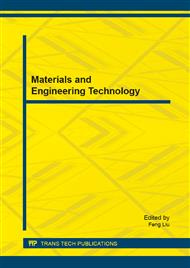[1]
Yannibelli V, Amandi A. Project scheduling: A multi-objective evolutionary algorithm that optimizes the effectiveness of human resources and the project makespan[J]. Engineering Optimization, 201.
DOI: 10.1080/0305215x.2012.658782
Google Scholar
[2]
Deb K. Multi-objective optimization[M]/Search methodologies. Springer US, (2014).
Google Scholar
[3]
Y L Zhang. A method of using lethal chromosome of genetic algorithm[D] (Chinese). Xi'an University of Technology, (2007).
Google Scholar
[4]
Heerkens, G.R., 2002. Project management. NewYork: McGraw-Hill.
Google Scholar
[5]
Bellenguez, O., and Néron, E. Methods for the multi-skill project scheduling problem. In: Proceedings of the 9th International Workshop on Project Management and Scheduling (PMS'2004), Nancy, p.66–69, (2004).
DOI: 10.1002/9780470611227.ch9
Google Scholar
[6]
Bellenguez, O., and Néron, E. A branch-and-bound method for solving multi-skill project scheduling problem. RAIRO – Operations Research, 41, No. 2, 155-170 (2007).
DOI: 10.1051/ro:2007015
Google Scholar
[7]
Bellenguez, O., and Néron, E. Lower Bounds for the Multi-skill Project Scheduling Problem with Hierarchical Levels of Skills. PATAT 2004, volume 3616 of Lecture Notes in Computer Science, page 229-243 (2004). Springer.
DOI: 10.1007/11593577_14
Google Scholar
[8]
Hanne, T. and Nickel, S. A multiobjective evolutionary algorithm for scheduling and inspection planning in software development projects. European Journal of Operational Research 167 (2005) 663-678, Elsevier.
DOI: 10.1016/j.ejor.2004.07.014
Google Scholar
[9]
Heimerl, C., and Kolisch, R. Scheduling and staffing multiple projects with a multi-skilled workforce. OR Spectrum, Vol. 32, No. 4, pp.343-368, 2010, Springer.
DOI: 10.1007/s00291-009-0169-4
Google Scholar
[10]
Gutjahr, W.J., Katzensteiner, S., Reiter, P., Stummer, Ch., and Denk, M. Competence driven project portfolio selection, scheduling and staff assignment. Central European Journal of Operations Research 16 (3), pp.281-306 (2008), Springer.
DOI: 10.1007/s10100-008-0057-z
Google Scholar
[11]
Boctor, F.F. An adaptation of the simulated annealing algorithm for solving resource constrained project scheduling problems. International Journal of Production Research, 34 (1996), pp.2335-2351.
DOI: 10.1080/00207549608905028
Google Scholar
[12]
Kolisch, R., and Sprecher, A. PSPLIB - A project scheduling library. European Journal of Operational Research, 96 (1997), 205 - 216. Elsevier.
DOI: 10.1016/s0377-2217(96)00170-1
Google Scholar
[13]
Deb K. Multi-objective optimization using evolutionary algorithms[M]. Chichester: John Wiley & Sons, (2001).
Google Scholar


